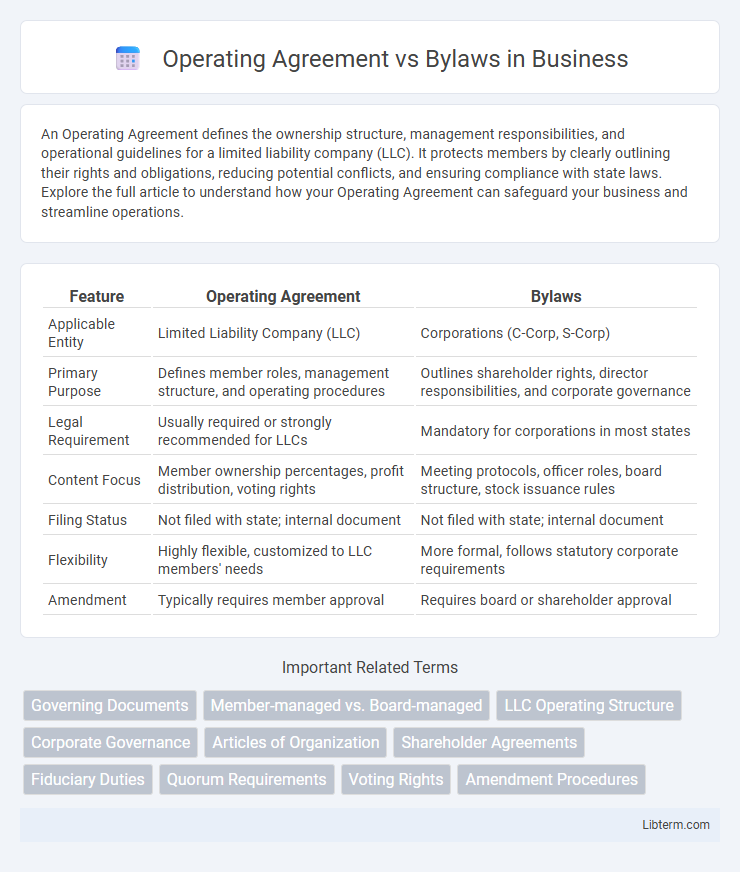An Operating Agreement defines the ownership structure, management responsibilities, and operational guidelines for a limited liability company (LLC). It protects members by clearly outlining their rights and obligations, reducing potential conflicts, and ensuring compliance with state laws. Explore the full article to understand how your Operating Agreement can safeguard your business and streamline operations.
Table of Comparison
| Feature | Operating Agreement | Bylaws |
|---|---|---|
| Applicable Entity | Limited Liability Company (LLC) | Corporations (C-Corp, S-Corp) |
| Primary Purpose | Defines member roles, management structure, and operating procedures | Outlines shareholder rights, director responsibilities, and corporate governance |
| Legal Requirement | Usually required or strongly recommended for LLCs | Mandatory for corporations in most states |
| Content Focus | Member ownership percentages, profit distribution, voting rights | Meeting protocols, officer roles, board structure, stock issuance rules |
| Filing Status | Not filed with state; internal document | Not filed with state; internal document |
| Flexibility | Highly flexible, customized to LLC members' needs | More formal, follows statutory corporate requirements |
| Amendment | Typically requires member approval | Requires board or shareholder approval |
Introduction to Operating Agreements and Bylaws
Operating Agreements and Bylaws serve as essential governing documents for businesses, with Operating Agreements tailored primarily for Limited Liability Companies (LLCs) and Bylaws for corporations. An Operating Agreement outlines the management structure, member roles, and operational procedures specific to an LLC, ensuring clarity and legal protection for members. Bylaws establish the internal rules for corporations, detailing board responsibilities, shareholder meetings, and voting protocols to maintain organizational order and compliance.
Definition of Operating Agreement
An Operating Agreement is a legal document that outlines the ownership structure, management responsibilities, and operational procedures of a Limited Liability Company (LLC). Unlike corporate Bylaws, which govern the internal management of a corporation, the Operating Agreement defines members' rights, profit distribution, and decision-making processes specific to LLCs. This agreement serves as a binding contract that helps prevent conflicts and provides clarity on business operations.
Definition of Bylaws
Bylaws are a set of rules established by a corporation to govern its internal management, including the duties of directors, the conduct of meetings, and the rights of shareholders. They serve as an internal document outlining procedures for decision-making, roles, and responsibilities within the corporate structure. Unlike an operating agreement, which is used primarily for limited liability companies (LLCs), bylaws specifically apply to corporations and form the foundation for organizational governance.
Key Differences Between Operating Agreements and Bylaws
Operating Agreements govern the internal operations and management structure of a Limited Liability Company (LLC), detailing member roles, profit distribution, and decision-making processes. Bylaws serve as the foundational rules for a corporation's governance, outlining the responsibilities of directors and officers, shareholder meetings, and voting procedures. Unlike bylaws, Operating Agreements are essential for LLCs to define member rights and prevent default state rules, whereas bylaws formalize corporate governance and compliance requirements.
Legal Requirements for Operating Agreements
Operating Agreements are legally required for LLCs to establish the management structure, member roles, and operational procedures, whereas Bylaws are mandatory for corporations to regulate internal governance and officer duties. The Operating Agreement must comply with state-specific LLC laws, ensuring clear guidelines for ownership percentages, profit distribution, and dispute resolution. Failure to maintain a proper Operating Agreement can lead to default state rules governing the LLC, potentially causing legal and financial complications.
Legal Requirements for Bylaws
Bylaws are mandatory legal documents for corporations that outline the governance structure, officer roles, and meeting protocols as required by state corporate laws. Unlike operating agreements, which are primarily used by LLCs and may have flexible content, bylaws must comply with specific statutory requirements to maintain corporate legitimacy and legal protections. Failure to adopt proper bylaws can result in loss of limited liability protection and challenges in enforcing corporate actions.
Governance Structure: LLCs vs Corporations
LLCs utilize Operating Agreements to define flexible governance structures, allowing members to customize management roles, decision-making processes, and profit distribution according to their preferences. In contrast, Corporations rely on Bylaws that establish formal governance frameworks, including board of directors' responsibilities, officer roles, shareholder meetings, and stockholder rights. The Operating Agreement offers adaptability suited for member-managed or manager-managed LLCs, whereas Corporate Bylaws enforce standardized procedures required for compliance and shareholder governance.
Customization and Flexibility
Operating agreements offer greater customization and flexibility, allowing LLC members to tailor governance, profit distribution, and management structures based on specific needs. Bylaws are generally more rigid, providing standardized rules for corporations that follow state-required formalities and procedures. The adaptability of operating agreements makes them ideal for businesses seeking personalized operational control and unique member arrangements.
Which Document Your Business Needs
An Operating Agreement is essential for LLCs as it outlines management structure, member roles, and profit distribution, providing legal protection and clarity. Bylaws govern corporations, detailing the board of directors' responsibilities, shareholder meetings, and voting procedures. Choosing between these documents depends on your business structure: LLCs require Operating Agreements, while corporations need Bylaws to ensure compliance and operational efficiency.
Conclusion: Choosing Between Operating Agreement and Bylaws
Choosing between an Operating Agreement and Bylaws depends on the business structure, with Operating Agreements tailored for LLCs and Bylaws designed for corporations. Operating Agreements provide detailed management rules and member responsibilities, while Bylaws establish corporate governance and shareholder rights. Evaluating the company's legal form and governance needs ensures compliance and effective internal control.
Operating Agreement Infographic

 libterm.com
libterm.com